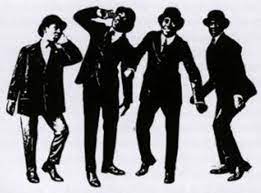What is Jubilee Quartet ?
Jubilee Quartet refers to a genre of African American gospel music that emerged in the late 19th century and became popular in the early 20th century. Jubilee Quartet music is characterized by its four-part harmony, which is usually sung a cappella or with minimal instrumentation. The name “Jubilee Quartet” comes from the biblical concept of the Jubilee, which was a time of celebration and freedom in which debts were forgiven and slaves were released. The genre has its roots in the spirituals and hymns of the African American church, and it often features tight harmonies and intricate vocal arrangements. Jubilee Quartet groups were typically made up of four male singers, but some groups also included female singers or instrumentalists. The genre was popularized by groups like the Golden Gate Quartet, the Dixie Hummingbirds, and the Fisk Jubilee Singers. Jubilee Quartet music has had a significant impact on American music, influencing genres like doo-wop, R&B, and soul. Today, Jubilee Quartet music is still performed and celebrated as an important part of African American musical heritage.
The Golden Gate Quartet
The Golden Gate Quartet is an American gospel music group that was formed in 1934 in Virginia. The group’s original members were Willie Johnson, William Langford, Henry Owens, and Orlandus Wilson. They began their career singing in churches and on street corners, and soon gained a reputation for their innovative vocal arrangements and energetic performances. The Golden Gate Quartet’s music combined elements of traditional African American gospel music with popular styles like jazz and swing. They were known for their tight harmonies, vocal percussion, and creative use of call-and-response and other vocal techniques. During the 1940s, the Golden Gate Quartet became one of the most popular gospel groups in the United States, and they toured extensively both nationally and internationally. They also recorded many albums and singles, including the classic song “Oh Happy Day”, which was later covered by other artists and became a popular anthem of the Civil Rights Movement. The group’s members changed over the years, but the Golden Gate Quartet continued to perform and record into the 21st century. They were inducted into the Gospel Music Hall of Fame in 1989, and their influence on gospel music and popular music in general is widely recognized.
The Dixie Hummingbirds
The Dixie Hummingbirds are a legendary American gospel music group that was formed in Greenville, South Carolina in the 1930s. The group’s original members were James Davis, Barney Parks, Paul Owens, and Beachey Thompson. Over the years, the group has had many members, but they have always been known for their tight harmonies, innovative arrangements, and high-energy performances. The Dixie Hummingbirds’ music combines elements of traditional African American gospel music with popular styles like doo-wop, R&B, and soul. They were one of the first gospel groups to incorporate electric guitars and other modern instruments into their sound. The group gained popularity in the 1940s and 1950s with hits like “Christian’s Automobile,” “Loves Me Like a Rock,” and “Thank You for One More Day.” They also became known for their collaborations with secular artists, including Stevie Wonder, Paul Simon, and Peter, Paul and Mary. The Dixie Hummingbirds have won many awards and accolades over the years, including multiple Grammy Awards and induction into the Gospel Music Hall of Fame. They have also been recognized for their contributions to American music and culture by the Smithsonian Institution and the National Endowment for the Arts. Today, the Dixie Hummingbirds continue to perform and record, with members carrying on the group’s legacy of gospel music excellence.
Meaningful message of the Jubilee Quartet
The Jubilee Quartet has a rich history and a meaningful message that has resonated with people for generations. At its core, the Jubilee Quartet is a form of African American gospel music that celebrates faith, freedom, and community. Through their music, Jubilee Quartet singers share messages of hope, redemption, and perseverance, often drawing on biblical themes and stories. They use tight harmonies and intricate vocal arrangements to convey the power of faith and the beauty of spiritual expression. In addition to their religious themes, Jubilee Quartet songs often reflect the social and political realities of African American life. They speak to the struggles and triumphs of Black people in the face of oppression, discrimination, and violence, and offer messages of resistance, resilience, and solidarity. The Jubilee Quartet’s message of faith, hope, and community has inspired generations of listeners and has had a significant impact on American music and culture. Today, their music continues to be celebrated and performed as a testament to the enduring power of gospel music and the important role it has played in the African American experience


